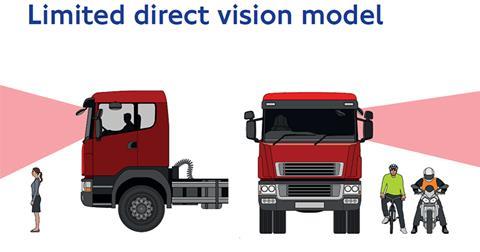
The FTA has expressed concern over TfL’s Direct Vision Standard, and questioned whether it’s the most effective approach for improving road safety in London.
TfL today launched the first consultation for the standard, and suggested non-compliance with it could be met with criminal proceedings.
The association’s national and regional policy director Christopher Snelling said that while direct vision cabs had “clear benefits”, they are limited. Therefore, he said, the Direct Vision Standard "may not be the best answer to improving safety on our roads”.
He added that research for TfL had shown that “no amount of direct vision would help in most cyclist incidents. Technology may prove a better route to minimising casualties as quickly as possible”.
Snelling also highlighted the fact that, following advice from TfL, many operators have invested in cameras and sensors to eliminate blind spots around cabs with apparent success”.
But, he said, that their work is to be mostly ignored as it is not accounted for under the Direct Vision Standard”.
In a release from TfL, councillor Julian Bell, chair of the London Council’s Transport and Environment Committee said it was taking “too long for lorry manufacturers to realise that their outdated juggernaut-style vehicles are not suitable for our city street environments”.
However Snelling said HGV manufacturing was a global enterprise, and discussions concerning it would be “better carried out at a Euopean or UN level”.
The RHA condemned the standard, branding it "completely the wrong message, completely unjustified and completely unsupported by evidence".
The association's director of policy Jack Semple added: "We look for evidence from TfL and we get none. We will be doing a full analysis of the consultation and responding in due course.”













